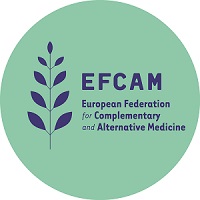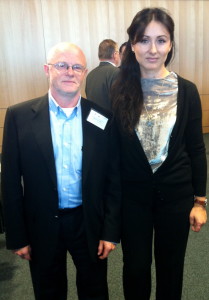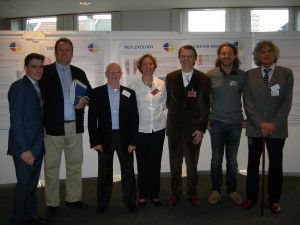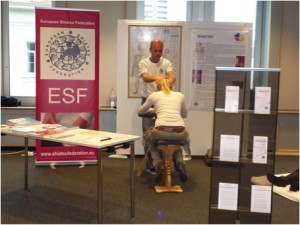European Parliament Conference on Complementary and Alternative Medicine
The first ever conference at the European institutions on Complementary and Alternative Medicine, CAM, took place on Tuesday October 9th in the European Parliament.
“CAM: Innovation and Added Value for European healthcare” was the theme of the conference. It was hosted by MEP Elena Oana Antonescu (Romania) and co-hosted by MEPs Sirpa Pietikäinen (Finland) and Alojz Peterle (Slovenia).
The conference was accompanied by a three-day exhibition featuring demonstrations of reflexology and shiatsu where visitors to the exhibition could sample these two modalities. Posters illustrating several CAM modalities and stands providing publications and information on access to and uses of the modalities were also displayed.
Seamus Connolly, President of EFCAM, one of the 3 co-organisers, said that the conference was a major milestone in the formal recognition of the contribution of CAM practitioners to healthcare in Europe and to equitable access for all European citizens to the benefits of CAM.
EFCAM wishes to offer a big Thank You to everyone involved in organizing this milestone event, especially the hosting MEPs and their staff, the European Commission for its official sponsorship, the European Parliament and staff, EPHA the conference technical organiser, the sponsors who contributed towards the costs, the other organizing partners and all those who prepared and participated in the exhibition.
Across Europe at least up to 80% of the population use Complementary and Alternative Medicine largely paying for it out of their own pocket. Despite clear citizen use and demand, CAM has not received a proper consideration by the European institutions, despite a call to do so from the European Parliament as far back as 1997.
There are in the order of 360,000 CAM practitioners in Europe employing a range of modalities such as acupuncture, aromatherapy, herbal medicine, homeopathy, kinesiology, naturopathy, massage, reflexology, shiatsu and TCM. They offer a “whole person” approach to health with a focus on supporting the person’s health-maintaining capacities and where illness is treated according to the distinct diagnostic and treatment methods of the modalities used. This can be on a stand-alone basis and/or in ways complementary to conventional medicine.
Members of the European Parliament, health professionals, patients and policy makers gathered in the Parliament to hear and debate presentations on the innovative added value of Complementary and Alternative Medicine for European Healthcare.
Participants at the Conference forcefully concluded that the potential within CAM to maintain health, prevent ill-health, promote healthier lifestyles and contribute to the sustainability of health systems should not be disregarded by the European Union especially at a time when health funding is under such pressure from economic and demographic pressures.
The conference ended with a Call for Action asking the European Commission, inter alia:
– to promote equitable access for citizens to CAM in Member States,
– to include CAM in all possible Community Actions dealing with health education and promotion, prevention and treatment of chronic disease, health inequalities, and active and healthy ageing,
– to encourage Member States to explore the ways in which CAM can contribute to sustainable healthcare systems in Europe including its role in health maintenance, health education, self-responsibility for health, motivation for healthy lifestyle change and less invasive and more cost-effective treatment of illness,
– to propose the requisite draft directives, or amendments to existing directives, to ensure freedom of establishment and freedom to provide services for providers of CAM,
– to ensure that the management of relevant Commission programmes, such as the Health for Growth, Horizon 2020, European Innovation Partnership on Healthy and Active Aging, gives an equitable opportunity to CAM projects to participate.
A brief selection from some of the presentations follows here:
Elena Oana Antonescu, MEP and host: “The fact that more and more Europeans live longer requires the adaptation of entire healthcare systems. I believe that complementary and alternative medicine can help promote a healthier and more environmentally aware lifestyle, with significant benefits to personal and societal health. Complementary and alternative medicine has the capacity to change the medical treatment philosophy, by adopting a more holistic outlook on illness and its effects.”
Sirpa Pietikainen, MEP and co-host: “There is a growing demand for CAM therapies in Europe. We as the European legislators need to facilitate safe accessibility to these therapies by providing a functioning, legal framework. The next EU Health Strategy needs to set a clear and enhanced role for CAM therapies with a view to European level regulation to be established in the future.”
Andrew Long, Professor of Health Systems Research, University of Leeds, United Kingdom: “Equitable access to healthcare, including CAM, and the sustainability of health services requires a shift towards health promotion and prevention of illness. CAM has the potential to support strategies to increase critical health literacy amongst EU citizens in collaboration with conventional medicine.”
Helle Johannessen, Professor of Social Studies in Health and Medicine, Institute of Public Health, Faculty of Health Sciences, University of Southern Denmark, Denmark: “Up to 80% of citizens in the EU Member States have used complementary and Alternative Medicine in their health care. Their hope is to get relief from concerns that the conventional medical services do not meet and to improve general wellbeing. And yet, access to CAM, with rare exceptions is limited to those who can afford to pay for it.”
Harald Walach, Professor of Research Methodology and Complementary Medicine, European University Viadrina, Frankfurt/Oder, Germany: “The growth potential of the sector, in terms of GDP, savings on healthcare, healthier citizens, CAM workforce and innovative competitiveness is enormous. For this to happen, we need the EU to give it its due consideration and adequate resources, as well as a framework for professionals to operate in.”
In separate news items below you will find:
Declaration and Call for Action (full text)
Press Release
Conference Programme
Presenters Short Biographies
Links to the Conference Presentations



